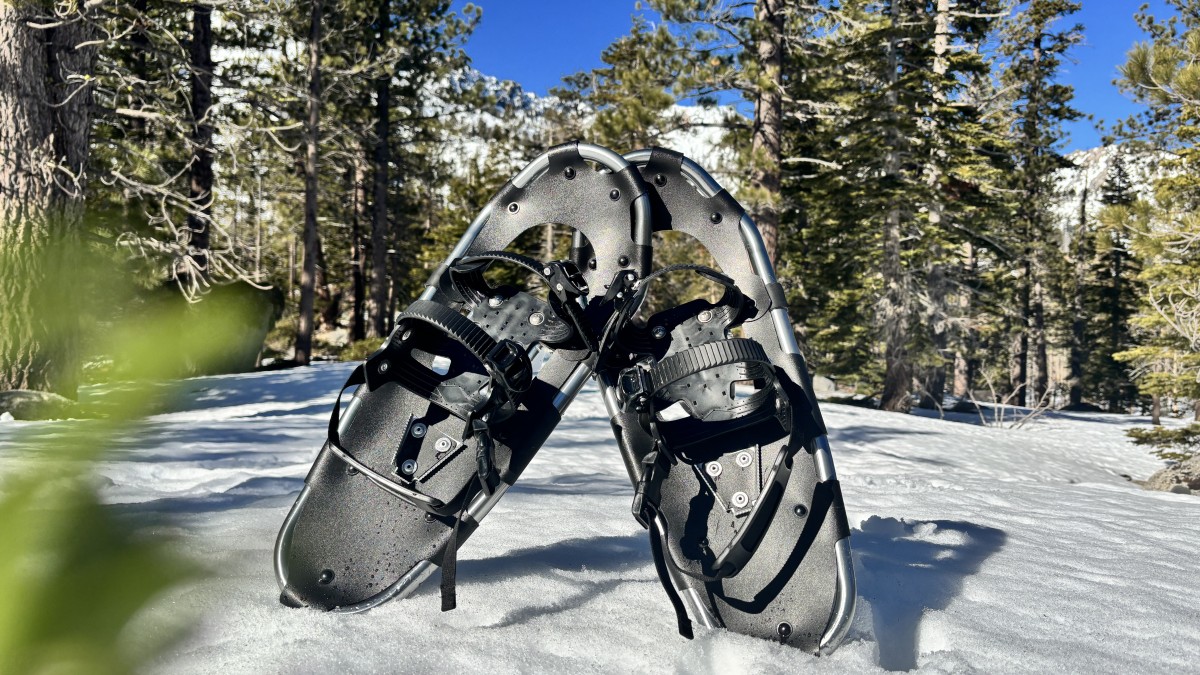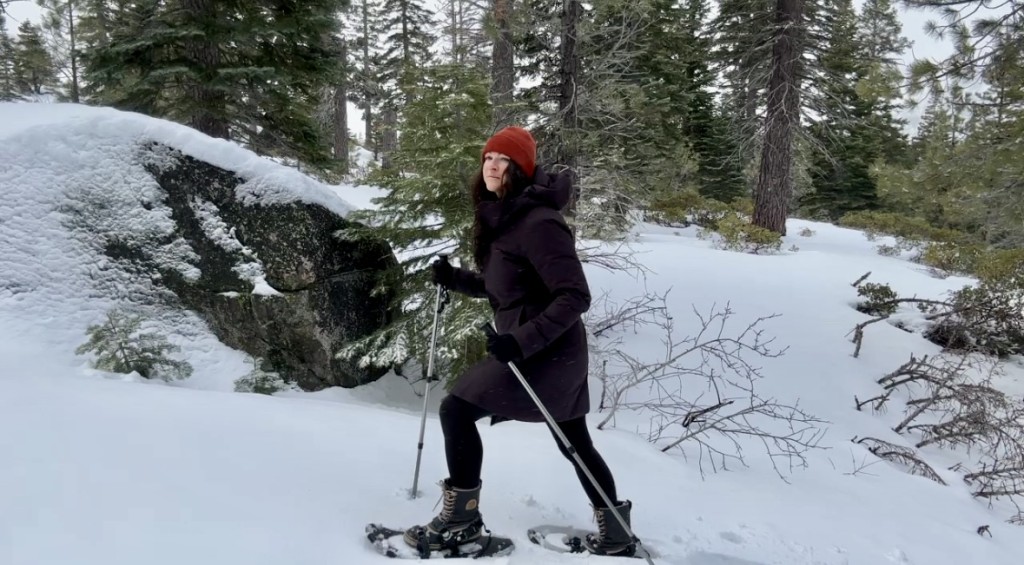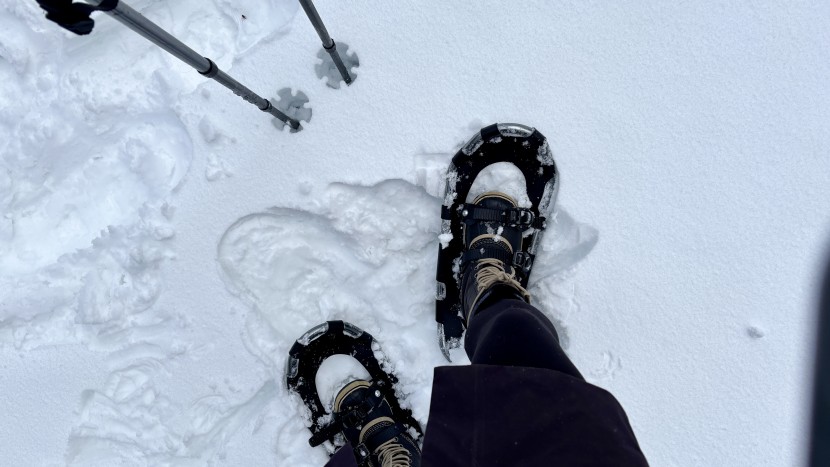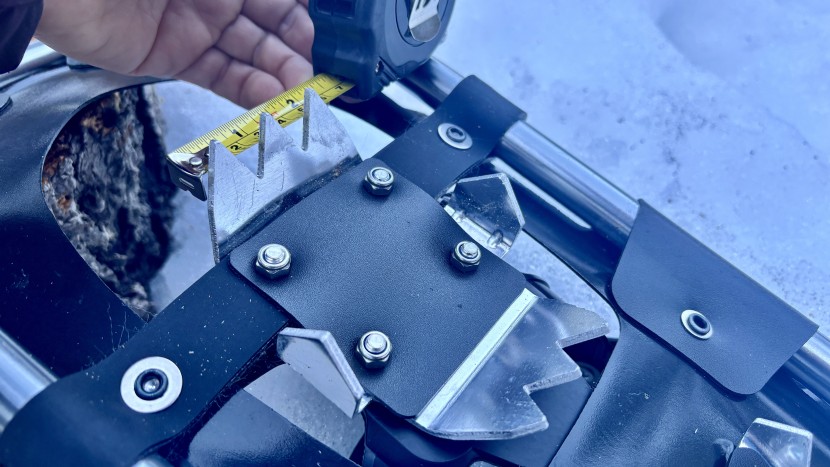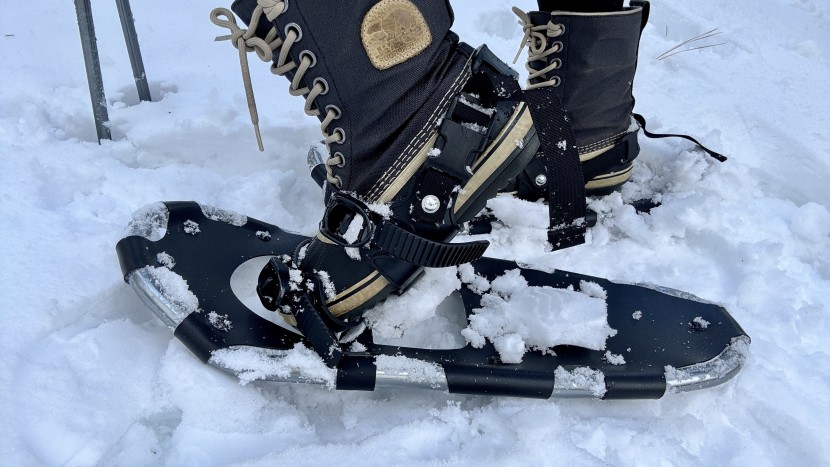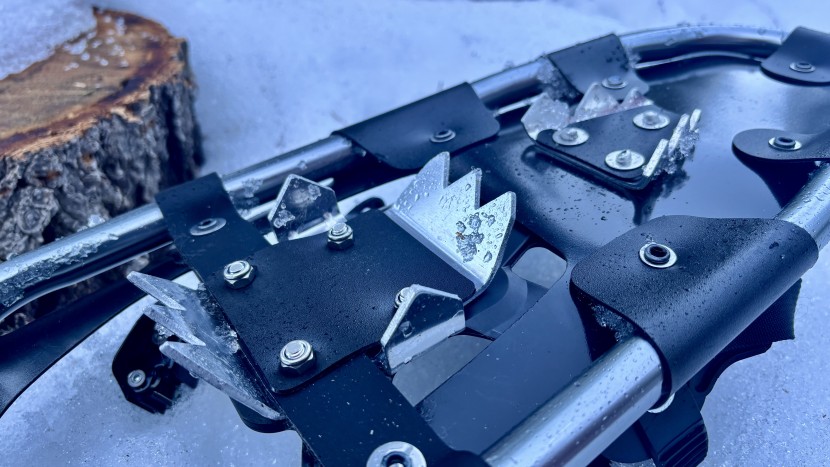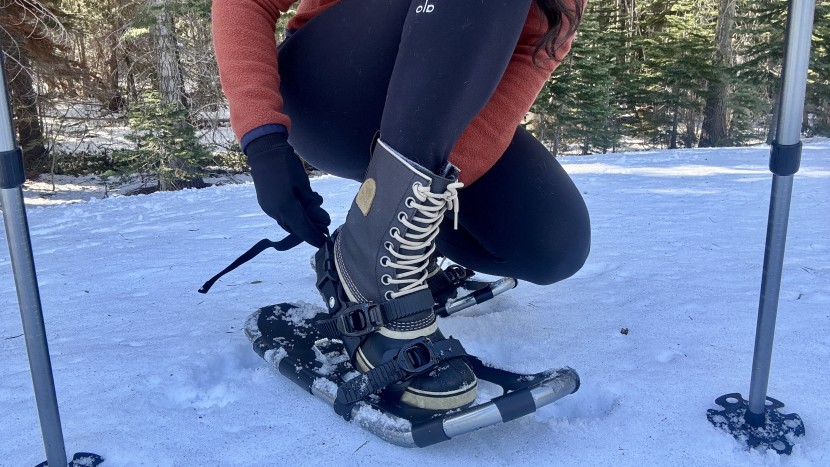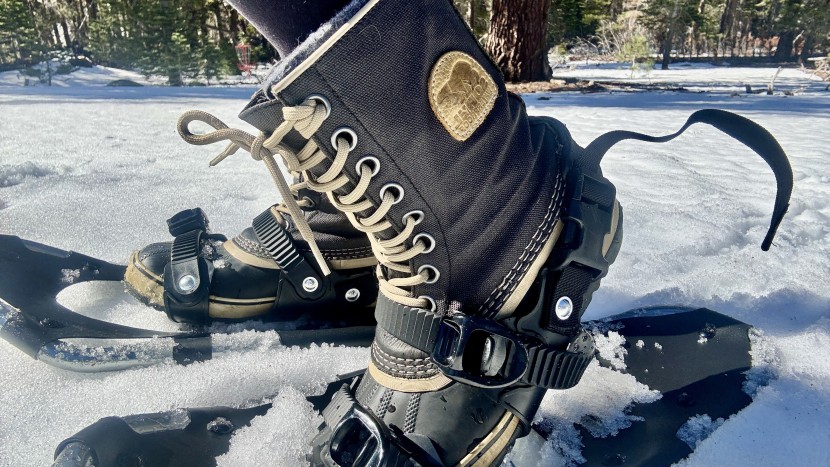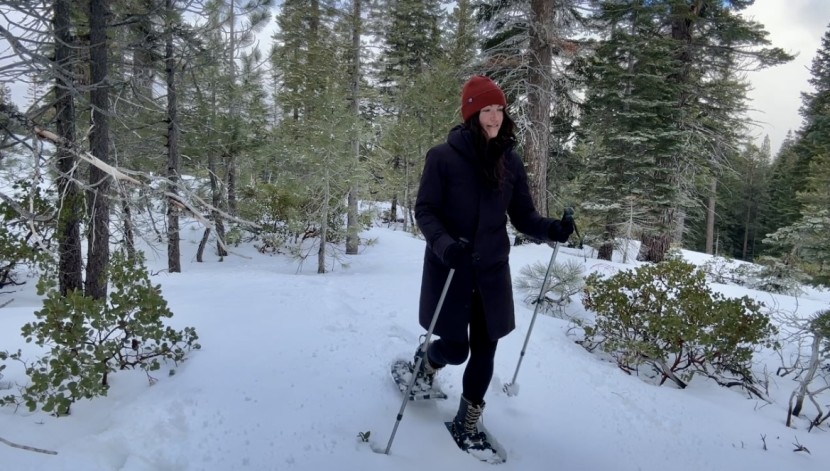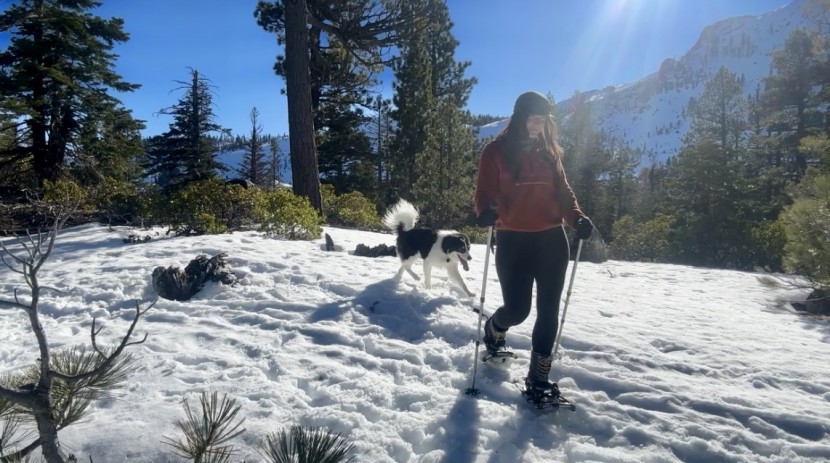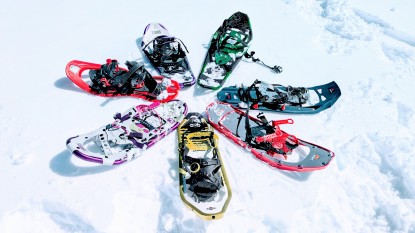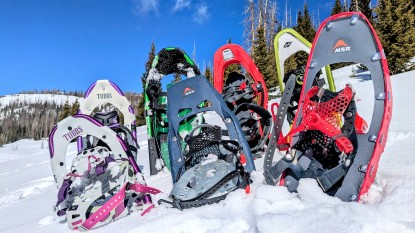Our Verdict
Compare to Similar Products
 This Product
Goplus - Women's | |||||
|---|---|---|---|---|---|
| Awards | Best on a Tight Budget | Best Overall Snowshoe for Women | Best for Backcountry Powder | Best Bang for Your Buck | Most User-Friendly Design at a Moderate Price |
| Price | $60 List | $296.05 at Amazon Compare at 2 sellers | $188.96 at Amazon Compare at 2 sellers | $161.45 at Amazon Compare at 2 sellers | $164.96 at Backcountry Compare at 2 sellers |
Overall Score  |
|||||
| Star Rating | |||||
| Bottom Line | An affordable yet low-grade pair of snowshoes for leisurely walks, short hikes, and casual winter outings with the family | If superior traction and versatility out in the steep and variable backcountry terrain is what you're looking for, the Lightning Ascent delivers in spades | These snowshoes provide excellent flotation and support for heavy loads in all winter conditions, offering the float and durability you can trust for winter backpacking | Excellent traction and versatile bindings mean you will have no problem heading into a wide spectrum of snow types and terrain levels with this widely popular and durable snowshoe | This snowshoe is perfect for everyday use with its easy-to-use and comfortable binding system, superior flotation, and ability to carry heavy loads |
| Rating Categories | Goplus - Women's | MSR Lightning Ascen... | Tubbs Mountaineer -... | MSR Evo Trail Snows... | Tubbs Wilderness -... |
| Flotation (30%) | |||||
| Traction (30%) | |||||
| Walkability (20%) | |||||
| Bindings (20%) | |||||
| Specifications | Goplus - Women's | MSR Lightning Ascen... | Tubbs Mountaineer -... | MSR Evo Trail Snows... | Tubbs Wilderness -... |
| Measured Weight (per pair) | 3.8 lbs | 3.9 lbs | 4.6 lbs | 3.7 lbs | 4.1 lbs. |
| Sizes Available | 21", 25", 30" | 22", 25" | 21", 25", 30" | 22" | 21", 25", 30" |
| Binding System | Ratchet strap with quick-release buckles | Paragon Binding | Active Fit 2.0 | Paraglide Binding | Quick-Fit Binding |
| Frame Material | Aluminum | Aluminum | Aluminum | Martensitic steel | Aluminum |
| Measured Surface Area | 143.0 in² | 157.5 in² | 162.8 in² | 156.1 in² | |
| Measured Dimensions | 8.0 x 25.0 sq in | 7.25 x 22.0 sq in | 8.5 x 21.0 sq in | 8.0 x 22.0 sq in | 8.0 x 21.0 sq in |
| Binding Mount | Strapped | Full | Full | Full | Full |
| Crampon | Aluminum crampons and teeth | DTX crampon | Anaconda toe crampon and Python heel crampon | Steel traction rails | Cobra toe and Tubbs heel crampon |
| Deck Material | Polyethylene fabric | TPU coated Nylon | Soft-Tec PVC-coated polyester | Polypropylene | Soft-Tec PVC-coated polyester |
| Flotation Tails Available? | No | Yes, 5 in | No | Yes, 6 in. | No |
| Load with Tails (per size) | N/A | 22": up to 240 lbs 25": up to 270 lbs |
N/A | 22": up to 250 lbs | N/A |
| Men's and Women's Versions? | Unisex | Yes | Yes | Unisex | Yes |
| Optimum Weight Load (per size) | 65-155 lbs (size 21") 110-200 lbs (size25") 150-260 lbs (size30") | 22": up to 180 lbs 25": 120-210 lbs |
21": 80-150 lbs 25" 120-200 lbs 30": 170-250 lbs |
One size: 180 lbs | 21": 80-150 lbs 25": 120-200 lbs 30": 170-250 lbs |
| Size Tested | 25" | 22" | 21" | 22" | 21" |
Our Analysis and Test Results
The GoPlus snowshoes are one of several budget-friendly options that deliver reliable performance for many hikers. While they don't stand out in any particular category, they come with useful extras like a basic carrying bag and trekking poles for folks who only need a simple pair of snowshoes for limited use. Keep reading for a closer look at their performance features.
Flotation
When sinking waist-deep into snow while handling casual business isn't part of your plan, it's time to eye a pair of snowshoes to keep you afloat in wintery conditions. But here's the catch: snow days are never exactly alike. Some days, you can stroll outside in just your winter boots without even a pause in your gait to navigate the snow. Other days, even the chunkiest snowshoes won't save you from post-holing into the white abyss. Nature keeps things interesting.
During testing, we found that the primary design factor influencing flotation results is a snowshoe's surface area. The more surface area, the better the shoe distributes weight, making travel through soft, deep powder much easier. The GoPlus snowshoes offer a surface area that measures around average compared to others in our test group. While they provide decent flotation, they aren't the largest model in the bunch, meaning they perform well in moderate conditions but may struggle in ultra-light powder or deep drifts. One of our lead testers said, “For the price, I think these get the job done well enough for casual hikes — but don't expect top-tier stability in deep or uneven snow.” If you're venturing into serious backcountry fluff, you will want something more technical, with advanced floatation. Yet, these do the job well enough for most easy-paced recreational outings.
Other models with a similar surface area performed slightly better in this category. This reveals another important design distinction: deck structure. Over many years of testing, we've found that where square inches are equal (i.e., two snowshoes have the same or nearly identical surface area), models built with stiffer decks and firmer deck-to-binding connections tend to provide better stability and flotation comparatively. In the case of the GoPlus, its deck feels loosely attached to the frame compared to other models. This affects the snowshoe's overall responsiveness. Strapped binding-to-deck connections often feel slightly sloppy in use, and this model is not different. The results are that they are less stable on uneven terrain or in deep, soft snow. While they still work well for casual hikes on well-packed trails or chores in the yard, they are unlikely to be a reliable choice for more technical or backcountry adventures.
Traction
The GoPlus snowshoes didn't rank highly for traction compared to other models in our review, but they have some strengths. The forefoot features large traction teeth that provide both forward and lateral grip, offering decent stability on moderate terrain.
Throughout testing, snowshoes with a tubular frame typically struggle when traversing steep terrain since the rounded metal edges make first contact with the snow, often resulting in reduced grip. The GoPlus stands out in this area with two front-facing traction teeth specifically positioned for lateral grip. While many models angle their front teeth slightly, few have them fully perpendicular to the direction of travel, which can improve stability when moving across slopes.
Another notable traction feature is the non-slip metal plate on the deck beneath the heel. In many snowshoe models, boots tend to pivot downslope while traversing, reducing pressure on the teeth that provide heel traction and increasing the likelihood of slipping. The GoPlus's metal plate helps counteract that movement, allowing its smaller heel teeth to grip more effectively. We noticed that ice buildup could occur when moving through sloppy, packed-snow conditions, potentially reducing the plate's effectiveness. That said, this wasn't an issue in lighter snow and when exploring well-packed trails; the plate worked as intended, improving stability on sidehills.
The GoPlus snowshoes use aluminum traction teeth, which, while lightweight, are softer than the steel teeth found on higher-end models. To compensate, the teeth are made thicker, reducing their ability to bite into hard snow and ice effectively. Additionally, aluminum wears down more quickly than steel, meaning the teeth dull faster over time, making these snowshoes well-suited for casual snowshoeing but less ideal for technical terrain.
Walkability
A key factor we evaluate in this category is how the binding attaches to the deck. This connection can range from a rigid hinge system to a flexible rubber or fabric strap or even a hybrid of the two. Each type affects performance differently, influencing stability, mobility, and comfort. The effectiveness of a particular design ultimately depends on how well it aligns with the snowshoe's intended purpose.
The fully strapped binding-to-deck connection on the GoPlus snowshoes offers a cushioned, less rigid feel, similar to what you might find with full rotation/pivot binding systems found on higher-end models. This design provides added comfort on firm, packed snow but lacks precision on technical terrain. While premium models balance flexibility with responsiveness, the GoPlus leans more toward comfort over control.
The extra flex in the deck and strapped binding connection, which we discussed in the flotation metric, also impacted the walkability of the GoPlus. Snowshoes with strapped binding-to-deck connections often feel a bit looser. In this case, our testers found their performance even less stable than we saw in others. “It was fine for casual, easy hikes, but the second the terrain got uneven or tricky, I could really feel the bindings shifting underfoot,” reports main tester Kat Elliott. While this wasn't a major issue on short, mellow hikes —- both on and off trail — it became highly noticeable as conditions got more challenging.
Bindings
Bindings secure the snowshoe to your boot, and they're often the most intricate part of the design. A good binding should be straightforward, durable, and easy to adjust, even when rushing, wearing gloves, or dealing with cold, wet conditions.
The GoPlus features a binding system commonly seen in budget-friendly snowshoes. It uses two ratchet straps to secure the forefoot—similar to the buckle system found on snowboard bindings. While this design isn't a favorite among our testers, it's a reliable, well-established setup. Adjusting the tension is fairly intuitive, and taking them off is quick and hassle-free.
During testing, we noticed that because the GoPlus snowshoes are a unisex model, smaller boots—such as a women's size 8 required the straps to be fully tightened to achieve a secure fit. This left the ends of the straps extending close to the edge of the deck. While this didn't cause any immediate issues, it could potentially lead to snags or wear over time, especially in brushy or uneven terrain. This is something to note for those with smaller feet, as it could impact walkability and long-term durability results.
The fixed binding system keeps the boot relatively parallel to the snowshoe, meaning the entire frame lifts with each step while still allowing some flex under the ball of the foot/toe bar. This setup isn't as efficient on slopes but promotes a more natural walking stride on flat and hard-packed terrain. Overall, the GoPlus snowshoes prioritize ease of use and comfort, making them best suited for recreational snowshoeing and outdoor winter chores rather than technical backcountry adventures.
For closure, many more affordable snowshoes use a nylon webbing heel strap with a plastic side-squeeze buckle. While functional, we've found that nylon straps tend to stiffen and can even freeze when wet, especially in temperatures hovering around 32°F. The plastic buckles can also easily get clogged with snow and ice, making adjustments more difficult in cold conditions. “I find they work fine in dry, powdery snow, but once things get wet and sloppy, the straps start to stiffen up, and the buckles can get jammed with ice,” one tester observed.
Should You Buy The GoPlus Snowshoes?
The GoPlus snowshoes aren't built for high-performance adventures, but not everyone needs a premium pair. If you're heading out for a casual family hike on a groomed trail, walking the dog after a fresh snowfall, or need a way to trek up your unplowed driveway, these snowshoes will do the trick. They're lightweight, affordable, and easy to use, making them an inexpensive yet worthy buy for occasional use. However, if you spend a lot of time snowshoeing or plan to venture into rugged, backcountry terrain mid-winter, you'll want something more durable and performance-driven. Our main tester, Kat Elliott, said, “They're the kind of snowshoes I might keep by the door for when I just need to get from point A to point B without post-holing, but not what I grab when I'm headed out for a day with friends on the mountain.”
What Other Snowshoes Should You Consider?
Not every shopper needs the top tech in the industry, but sometimes you want a bit more flexibility if you are going to invest in a new piece of gear. For a pair that truly balances performance at a great price but is ready to tackle even more demanding terrain, we would direct you to look at the MSR Evo Trail Snowshoes. They won't cost you an arm and a leg, yet they still deliver an impressive performance, and they will travel farther with you than the GoPlus. Should cost be less of a consideration, and you want the best-of-the-best for all kinds of snowy hikes, check out the MSR Lightning Ascent instead.


